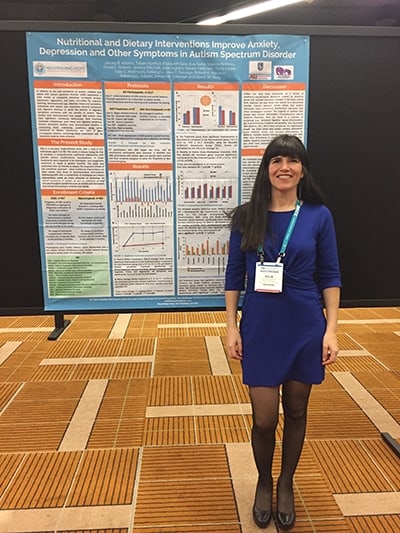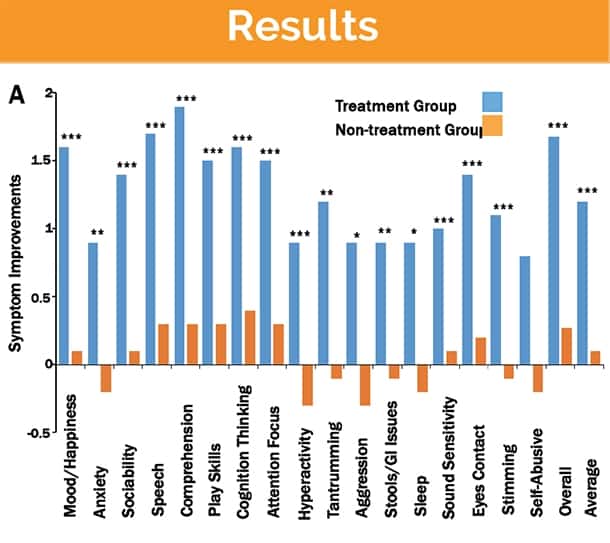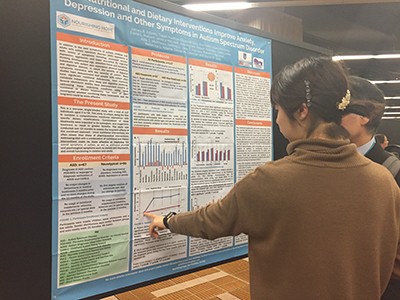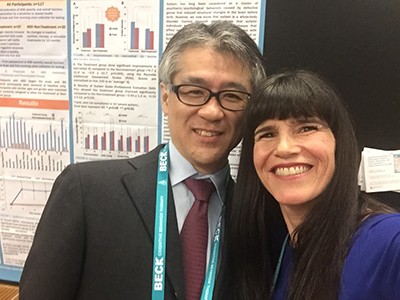 Last week I presented a research poster of our autism nutrition study at the Anxiety and Depression Association of America (ADAA) conference. A poster session is a room of (in this case) 200 researchers presenting their research, data, and graphs on a large 4 foot poster – think science fair for adults! And participants have dedicated time to talk with the researchers and ask questions about our study.
You might be wondering…
Anxiety and depression conference?
Not an autism conference?
Yep, that’s right.
See, in our study we found that the individuals with autism had significant improvement in anxiety and depression (represented as “mood/happiness”). We also found other mental health and behavior symptoms also improved such as: tantrumming, aggression, sociability, as well as attention and hyperactivity.
Last week I presented a research poster of our autism nutrition study at the Anxiety and Depression Association of America (ADAA) conference. A poster session is a room of (in this case) 200 researchers presenting their research, data, and graphs on a large 4 foot poster – think science fair for adults! And participants have dedicated time to talk with the researchers and ask questions about our study.
You might be wondering…
Anxiety and depression conference?
Not an autism conference?
Yep, that’s right.
See, in our study we found that the individuals with autism had significant improvement in anxiety and depression (represented as “mood/happiness”). We also found other mental health and behavior symptoms also improved such as: tantrumming, aggression, sociability, as well as attention and hyperactivity.
 In fact, all of the categories showed statistically significant improvement, except one that showed improvement by missed the cut off for “statistically significant.”
These results confirm what I often see in my practice, and I want more doctors and researchers to know about this approach.
You may have heard of our study by now, it used six diet and nutrition interventions for this long term, one year, study. And we are thrilled with the results that also included a 7 point increase in non-verbal IQ and developmental age improvement of 4.5 times the non-treatment group. You can read more about the study here.
I applied to present this research because I wanted to share this with audiences outside of autism – to introduce to other mental health organization how diet and nutrition can improve neurological conditions. And if they work with children with autism, I want them to know how helpful a nutrition approach can be.
In fact, all of the categories showed statistically significant improvement, except one that showed improvement by missed the cut off for “statistically significant.”
These results confirm what I often see in my practice, and I want more doctors and researchers to know about this approach.
You may have heard of our study by now, it used six diet and nutrition interventions for this long term, one year, study. And we are thrilled with the results that also included a 7 point increase in non-verbal IQ and developmental age improvement of 4.5 times the non-treatment group. You can read more about the study here.
I applied to present this research because I wanted to share this with audiences outside of autism – to introduce to other mental health organization how diet and nutrition can improve neurological conditions. And if they work with children with autism, I want them to know how helpful a nutrition approach can be.
 Most of the participants and speakers were psychologists and psychiatrics. So I was very excited to introduce them to something they may not be familiar with… how diet and nutrition can help mental health.
Most of the participants and speakers were psychologists and psychiatrics. So I was very excited to introduce them to something they may not be familiar with… how diet and nutrition can help mental health.
 As poster sessions began, Yutaka Matsuoka, MD with a PhD in psychiatry and clinical neuroscience and described his focus as Nutritional Psychiatry, came up to my poster and began asking questions about it. Fortunately, I was able to answer his questions! Haha. Because someone of his education and knowledge could have been very intimidating. Fortunately, he’s a very kind and I didn’t know how successful he is until later. 😉
I went to check out his poster on “Omega-3 polyunsaturated fatty acids and anxiety symptoms: a systemic review and meta-analysis.” (Here’s the abstract.) His poster won an award and it was the first spot in the session. Our autism study included omega-3s, so that was an interesting overlap in our research.
He is a powerhouse of research – look at all of Dr. Matsuoka’s research – 138 papers and counting! On Research Gate, he says, “My ongoing research project focuses on diet, gut microbiome and exercise to minimize the psychological burdens (fear of cancer recurrence, anxiety and depression) and to enhance the quality of survival for all people diagnosed with cancer along with their family caregivers.”
It was so rewarding to meet a doctor and researcher with Dr. Matsuoka’s focus on nutrition!
And it was an honor to be invited to present our research. Our study was well received. And I’m happy that our work is getting out into the world in new places so we can spread this important message that diet and nutrition help children, help autism, help anxiety and depression, and are worth trying.
For your own copy of our poster, you can download it here.
For step-by-step support on how to make diet and nutrition changes for any children (or adults) with autism, ADHD, or mental health needs based on my 17 years in clinical practice, download my free Guide: The 6 Nutrition Essentials to Improving Health, Learning, and Behavior in Your Child.
As poster sessions began, Yutaka Matsuoka, MD with a PhD in psychiatry and clinical neuroscience and described his focus as Nutritional Psychiatry, came up to my poster and began asking questions about it. Fortunately, I was able to answer his questions! Haha. Because someone of his education and knowledge could have been very intimidating. Fortunately, he’s a very kind and I didn’t know how successful he is until later. 😉
I went to check out his poster on “Omega-3 polyunsaturated fatty acids and anxiety symptoms: a systemic review and meta-analysis.” (Here’s the abstract.) His poster won an award and it was the first spot in the session. Our autism study included omega-3s, so that was an interesting overlap in our research.
He is a powerhouse of research – look at all of Dr. Matsuoka’s research – 138 papers and counting! On Research Gate, he says, “My ongoing research project focuses on diet, gut microbiome and exercise to minimize the psychological burdens (fear of cancer recurrence, anxiety and depression) and to enhance the quality of survival for all people diagnosed with cancer along with their family caregivers.”
It was so rewarding to meet a doctor and researcher with Dr. Matsuoka’s focus on nutrition!
And it was an honor to be invited to present our research. Our study was well received. And I’m happy that our work is getting out into the world in new places so we can spread this important message that diet and nutrition help children, help autism, help anxiety and depression, and are worth trying.
For your own copy of our poster, you can download it here.
For step-by-step support on how to make diet and nutrition changes for any children (or adults) with autism, ADHD, or mental health needs based on my 17 years in clinical practice, download my free Guide: The 6 Nutrition Essentials to Improving Health, Learning, and Behavior in Your Child.



0 Comments